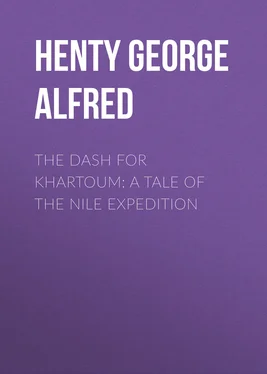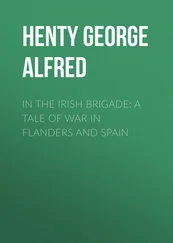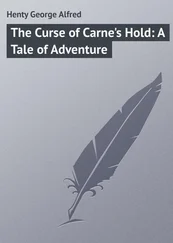George Henty - The Dash for Khartoum - A Tale of the Nile Expedition
Здесь есть возможность читать онлайн «George Henty - The Dash for Khartoum - A Tale of the Nile Expedition» — ознакомительный отрывок электронной книги совершенно бесплатно, а после прочтения отрывка купить полную версию. В некоторых случаях можно слушать аудио, скачать через торрент в формате fb2 и присутствует краткое содержание. Жанр: foreign_children, foreign_antique, foreign_prose, на английском языке. Описание произведения, (предисловие) а так же отзывы посетителей доступны на портале библиотеки ЛибКат.
- Название:The Dash for Khartoum: A Tale of the Nile Expedition
- Автор:
- Жанр:
- Год:неизвестен
- ISBN:нет данных
- Рейтинг книги:5 / 5. Голосов: 1
-
Избранное:Добавить в избранное
- Отзывы:
-
Ваша оценка:
- 100
- 1
- 2
- 3
- 4
- 5
The Dash for Khartoum: A Tale of the Nile Expedition: краткое содержание, описание и аннотация
Предлагаем к чтению аннотацию, описание, краткое содержание или предисловие (зависит от того, что написал сам автор книги «The Dash for Khartoum: A Tale of the Nile Expedition»). Если вы не нашли необходимую информацию о книге — напишите в комментариях, мы постараемся отыскать её.
The Dash for Khartoum: A Tale of the Nile Expedition — читать онлайн ознакомительный отрывок
Ниже представлен текст книги, разбитый по страницам. Система сохранения места последней прочитанной страницы, позволяет с удобством читать онлайн бесплатно книгу «The Dash for Khartoum: A Tale of the Nile Expedition», без необходимости каждый раз заново искать на чём Вы остановились. Поставьте закладку, и сможете в любой момент перейти на страницу, на которой закончили чтение.
Интервал:
Закладка:
Captain Moffat took off his coat and waistcoat and took the end facing the sergeant, and began to bowl some slow twisting balls, that were in strong contrast to the fast delivery of the sergeant. Edgar felt now that he was being tried, and played very cautiously. There were no runs to be made off such bowling until the bowler became careless or tired. At last a ball came rather farther than usual. Edgar stepped out to meet it, and drove it nearly straight forward and scored four, and it was not until his score ran up to thirty that he was at last caught.
"You will do, Smith," Captain Moffat said approvingly. "Where did you learn to play cricket?"
"I learned at school, sir."
"Ah! well, they taught you that well if they taught you nothing else. You go on practising, and I will give you a chance to play for the regiment the first time that there is a vacancy."
Two or three matches were played before the chance came. Then Sergeant Stokes, the bowler, hurt his hand the day before they were going to play the Rifle Brigade, which was considered the strongest team in camp.
"This is an unlucky business, sergeant," Captain Moffat said to him as they were talking over next day's play. "I thought if we had luck we might make a good fight with the Rifles. Bowling is never our strongest point, and now you are out of it we shall make a very poor show. Are there any of the men outside the eleven who show any bowling talent?"
The sergeant shook his head.
"Not one of them, sir. I hoped Corporal Holland would have made a bowler, but he seems to have gone off rather than come on. No; we must trust to the bowlers we have got. There are four or five of them who are not bad, though except yourself, sir, there is nothing, so to speak, to depend on."
"You cannot depend on me, sergeant; there is no certainty about my bowling. Sometimes I do pretty fairly, at other times I get hit all over the field. No; my proper place is wicket-keeping. I should never leave that if we had two or three bowlers we could depend upon. Well, we must go in for run making.
"I do not think that we can do better than put on that young trumpeter till you can play again. I have watched him several times at practice, and he always keeps his wickets up well, and hits freely whenever he gets a chance."
"Very well, sir. I will warn him that he will be wanted to-morrow. There can be no harm in trying him for once anyhow."
There was some little surprise among the men who played cricket at hearing that Trumpeter Smith was to play in the eleven against the Rifles, and some little grumbling among those who had hoped to be the next choice. However, all agreed that he was a very likely youngster. The Hussars won the toss, and went in first. The bowling of the Rifles was deadly, and the ten wickets fell for fifty-two runs. Edgar was the last to go in, and did not receive a single ball, his partner succumbing to the very first ball bowled after Edgar had gone out to the wicket. Then the Rifles went in, and the loss of the Hussars' fast bowler soon made itself felt. Two of the best bats of the Rifles were at the wicket, and in spite of several changes of bowling, seventy-four runs were scored without a separation being made. Captain Moffat looked round the field despairingly. He had tried all the men on whom he had any dependence. His own bowling had been very severely punished, and he had retired when thirty runs had been scored and was reluctant to take the ball again. As he was standing undecided after an over in which twelve runs had been scored, his eye fell on Edgar as he ran lightly across to take up his place on the opposite side.
"Smith!" Edgar ran up to him. "Do you bowl at all?"
"I have not bowled this season, sir, but I used to bowl pretty fairly."
"Very well, then, take the ball at this end after the next over. I am going to try Smith at this end," he said to the young lieutenant who was long-stop.
He shrugged his shoulders. "Well, there is one thing, he cannot make a worse mess of it than we are making already."
When the over was concluded, Edgar took the ball. The year that had elapsed since he had last played, and the gymnastics and hard exercise, had strengthened his muscles greatly, and as he tossed the ball from hand to hand while the field took their places he felt that he was more master of it than he had been before. He had then been a remarkably fast bowler for his age, and would have been in the eleven had it not happened that it already possessed three unusually good bowlers.
The first ball he sent up was a comparatively slow one; he wanted to try his hand. It was dead on the wicket, and was blocked; then he drew his breath, and sent the next ball in with all his force. A shout rose from the Hussars as two of the wickets went flying into the air. Another player came out, but at the fourth ball of the over his middle stump was levelled.
"What do you think of that, Langley?" Captain Moffat asked the long-stop as they walked together to the other end. "We have found a treasure. He bowls about as fast as any one I have ever seen, and every ball is dead on the wicket."
"He is first-class," the lieutenant, who was an old Etonian, said. "I wonder where he learnt to play cricket?"
The wickets fell fast, and the innings concluded for 98, Edgar taking seven wickets for twelve runs. Captain Moffat put him in third in the second innings, and he scored twenty-four before he was caught out, the total score of the innings amounting to 126. The Rifles had therefore eighty-one runs to get to win. They only succeeded in making seventy-six, eight of them being either bowled out by Edgar or caught off his bowling. After this he took his place regularly in the Hussar team, and it was generally acknowledged that it was owing to his bowling that the regiment that season stood at the head of the Aldershot teams.
CHAPTER VI.
EGYPT
Naturally his prowess at cricket made Trumpeter Smith a popular figure in the regiment, and even at the officers' mess his name was frequently mentioned, and many guesses were ventured as to who he was and what school he came from.
That he was a gentleman by birth nobody doubted. There was nothing unusual in that, for all the cavalry regiments contain a considerable number of gentlemen in their ranks; men of this class generally enlisting in the cavalry in preference to the other arms of the service. It was, however, unusual for one to enlist at Edgar's age. Many young men, after having failed to gain a commission by competition, enlist in hopes of working up to one through the ranks. Another class are the men who having got into scrapes of one kind or another, run through their money, and tired out their friends, finally enlist as the only thing open to them.
The first class are among the steadiest men in the regiment, and speedily work their way up among the non-commissioned officers. The second class are, on the other hand, among the wildest and least reputable men in the ranks. They are good men in a campaign where pluck and endurance and high spirits are most valuable, but among the worst and most troublesome when there is little to do and time hangs heavily on hand.
There were two of the sergeants who had failed in the examination for commissions, and were hoping some day to obtain them. One had been five years in the regiment, the other three. Their attention had first been called to Edgar by his getting a first-class in the examination, which at once stamped him as having had an education greatly superior to that of the majority of recruits. His position in the regimental cricket team further attracted their attention, and they took an opportunity to speak to him when it happened they were walking together and met Edgar returning from an afternoon's ramble across the country.
"Well, Smith, how do you like soldiering?"
Читать дальшеИнтервал:
Закладка:
Похожие книги на «The Dash for Khartoum: A Tale of the Nile Expedition»
Представляем Вашему вниманию похожие книги на «The Dash for Khartoum: A Tale of the Nile Expedition» списком для выбора. Мы отобрали схожую по названию и смыслу литературу в надежде предоставить читателям больше вариантов отыскать новые, интересные, ещё непрочитанные произведения.
Обсуждение, отзывы о книге «The Dash for Khartoum: A Tale of the Nile Expedition» и просто собственные мнения читателей. Оставьте ваши комментарии, напишите, что Вы думаете о произведении, его смысле или главных героях. Укажите что конкретно понравилось, а что нет, и почему Вы так считаете.












